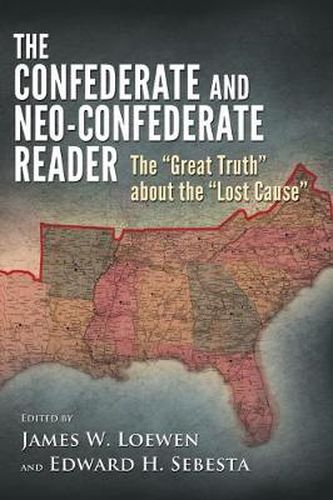Readings Newsletter
Become a Readings Member to make your shopping experience even easier.
Sign in or sign up for free!
You’re not far away from qualifying for FREE standard shipping within Australia
You’ve qualified for FREE standard shipping within Australia
The cart is loading…






This title is printed to order. This book may have been self-published. If so, we cannot guarantee the quality of the content. In the main most books will have gone through the editing process however some may not. We therefore suggest that you be aware of this before ordering this book. If in doubt check either the author or publisher’s details as we are unable to accept any returns unless they are faulty. Please contact us if you have any questions.
Most Americans hold basic misconceptions about the Confederacy, the Civil War, and the actions of subsequent neo-Confederates. For example, two thirds of Americans–including most history teachers–think the Confederate States seceded for
states’ rights.
This error persists because most have never read the key documents about the Confederacy.These documents have always been there. When South Carolina seceded, it published
Declaration of the Immediate Causes Which Induce and Justify the Secession of South Carolina from the Federal Union.
The document actually opposes states’ rights. Its authors argue that Northern states were ignoring the rights of slave owners as identified by Congress and in the Constitution. Similarly, Mississippi’s
Declaration of the Immediate Causes …
says,
Our position is thoroughly identified with the institution of slavery–the greatest material interest of the world. Later documents in this collection show how neo-Confederates obfuscated this truth, starting around 1890. The evidence also points to the centrality of race in neo-Confederate thought even today and to the continuing importance of neo-Confederate ideas in American political life. The 150th anniversary of secession and civil war provides a moment for all Americans to read these documents, properly set in context by award-winning sociologist and historian James W. Loewen and co-editor, Edward H. Sebesta, to put in perspective the mythology of the Old South.
$9.00 standard shipping within Australia
FREE standard shipping within Australia for orders over $100.00
Express & International shipping calculated at checkout
This title is printed to order. This book may have been self-published. If so, we cannot guarantee the quality of the content. In the main most books will have gone through the editing process however some may not. We therefore suggest that you be aware of this before ordering this book. If in doubt check either the author or publisher’s details as we are unable to accept any returns unless they are faulty. Please contact us if you have any questions.
Most Americans hold basic misconceptions about the Confederacy, the Civil War, and the actions of subsequent neo-Confederates. For example, two thirds of Americans–including most history teachers–think the Confederate States seceded for
states’ rights.
This error persists because most have never read the key documents about the Confederacy.These documents have always been there. When South Carolina seceded, it published
Declaration of the Immediate Causes Which Induce and Justify the Secession of South Carolina from the Federal Union.
The document actually opposes states’ rights. Its authors argue that Northern states were ignoring the rights of slave owners as identified by Congress and in the Constitution. Similarly, Mississippi’s
Declaration of the Immediate Causes …
says,
Our position is thoroughly identified with the institution of slavery–the greatest material interest of the world. Later documents in this collection show how neo-Confederates obfuscated this truth, starting around 1890. The evidence also points to the centrality of race in neo-Confederate thought even today and to the continuing importance of neo-Confederate ideas in American political life. The 150th anniversary of secession and civil war provides a moment for all Americans to read these documents, properly set in context by award-winning sociologist and historian James W. Loewen and co-editor, Edward H. Sebesta, to put in perspective the mythology of the Old South.